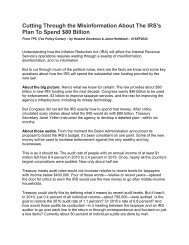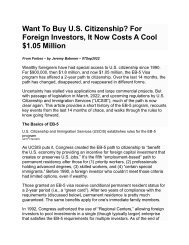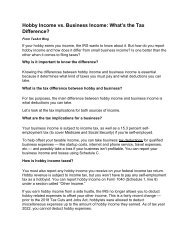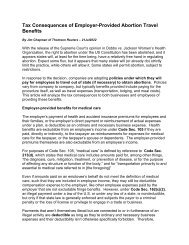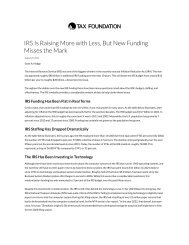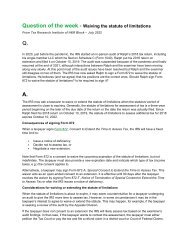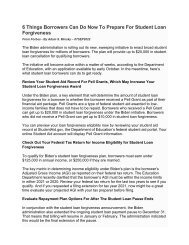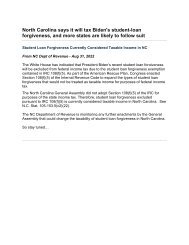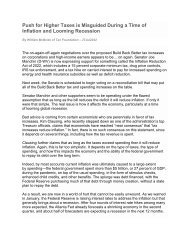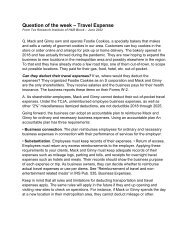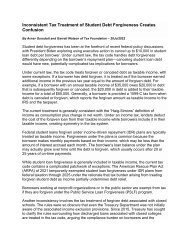US-taxes-for-international-students (1)
You also want an ePaper? Increase the reach of your titles
YUMPU automatically turns print PDFs into web optimized ePapers that Google loves.
International <strong>students</strong> are exempt from counting days <strong>for</strong> ve years from the rst date<br />
they enter the U.S.<br />
When a nonresident comes to the U.S. they will begin counting the days they are present in the U.S. <strong>for</strong><br />
the substantial presence test. International <strong>students</strong> can exclude the days they are present <strong>for</strong> any part of<br />
ve calendar years after the rst date they enter the U.S. as long as they are in school and meet the<br />
requirements of their F, J, M, or Q visa. This means that they won’t meet the substantial presence test as<br />
a student <strong>for</strong> ve calendar years and will le Form 1040NR.<br />
Example: Hans comes to the U.S. <strong>for</strong> the rst time as an <strong>international</strong> student from Germany on<br />
Jan. 24, 2019 on an F visa. He is exempt from counting days <strong>for</strong> the substantial presence test until<br />
Dec. 31, 2023, if he continues to study in the U.S. and meets the requirements of his visa. He will be<br />
exempt from counting days <strong>for</strong> part of 2019 and all of 2020, 2021, 2022, and 2023. He is a<br />
nonresident alien <strong>for</strong> those years, assuming he doesn’t meet the green card test during that time.<br />
He will begin counting days <strong>for</strong> the substantial presence test on Jan 1, 2024.<br />
It’s important to note that Hans cannot be exempt <strong>for</strong> any part of more than ve calendar years as a<br />
teacher, trainee, or student unless he establishes a closer connection to a <strong>for</strong>eign country.<br />
Other kinds of individuals on certain visas are exempt from counting days <strong>for</strong> the substantial presence<br />
test including teachers and trainees, diplomats, and professional athletes.<br />
J visa <strong>students</strong> and changing to a teacher or trainee designation<br />
One area of tax confusion <strong>for</strong> <strong>international</strong> <strong>students</strong> on J visas arises when a J visa holder is a university<br />
student and also a professor, assistant professor, or a trainee in a specic profession. A teacher or<br />
trainee is dened as anyone with a J or Q visa, other than a student, who substantially complies with the<br />
requirements of their visa. The distinction between the two is important because teachers and trainees<br />
are exempt from the substantial presence test <strong>for</strong> only two calendar years. They are not exempt if they<br />
have been exempt as a student, teacher, or trainee <strong>for</strong> any part of two of the last six calendar years.<br />
This determination is extremely important, especially <strong>for</strong> <strong>students</strong> who start graduate assistant programs<br />
that include student teaching or apprenticeships where their visa status changes from student to teacher<br />
or trainee. If they’re in the U.S. <strong>for</strong> more than two years, they might be a resident alien and will le Form<br />
1040 instead of Form 1040NR, as described below.<br />
International <strong>students</strong> usually le a tax return reporting annual<br />
income<br />
If an <strong>international</strong> student is a resident alien <strong>for</strong> U.S. tax purposes, then they will le Form 1040 using the<br />
same rules <strong>for</strong> U.S. citizens and resident aliens.<br />
Nonresident alien <strong>students</strong> le Form 1040NR, with exceptions<br />
If the <strong>international</strong> student is a nonresident alien <strong>for</strong> U.S. tax purpose, they are required to le Form<br />
1040NR if they have any taxable income during the year, with exceptions.



